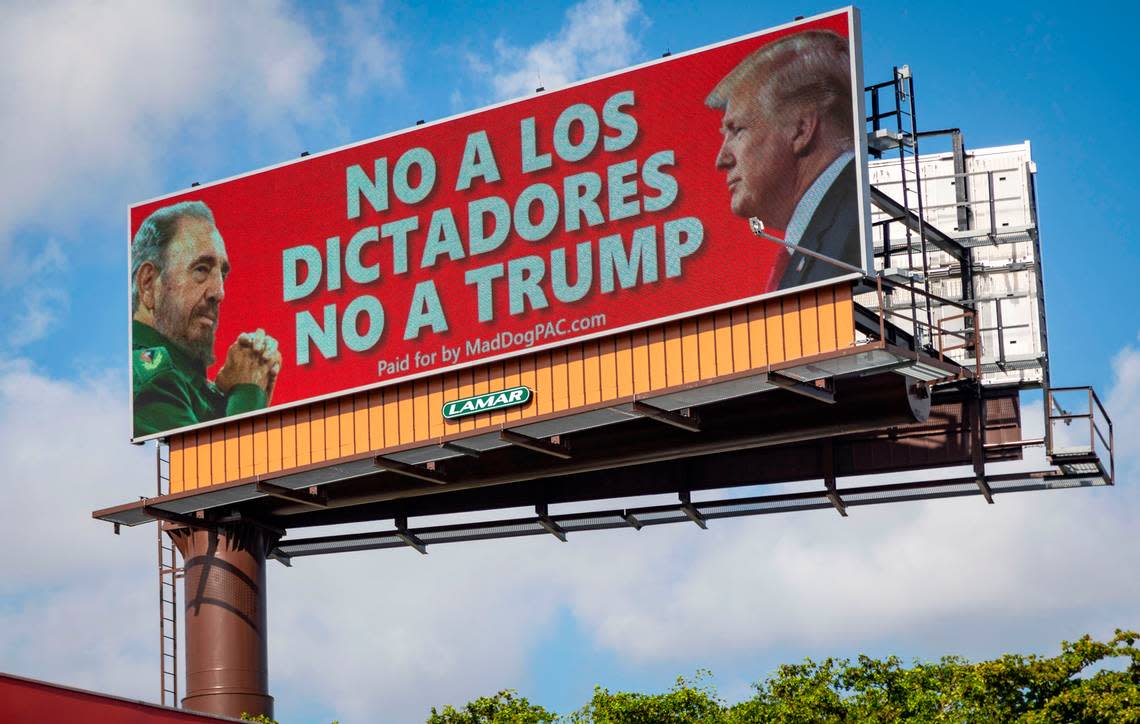‘No to dictators, no to Trump’: Billboard on Palmetto draws outrage, agreement in Miami

- Oops!Something went wrong.Please try again later.
A roadside billboard in Miami that draws comparisons between Donald Trump and dictators like Fidel Castro is aiming to strike a chord with South Florida Hispanics. For some, it’s touching a nerve.
The billboard, which reads “No a los dictadores, no a Trump” – “No to dictators, no to Trump” – was posted Monday along the Palmetto Expressway near Northwest 67th Avenue by an anti-Trump outside group called Mad Dog PAC. It depicts Trump and the late Castro face-to-face on opposite sides of the sign.
The “dictator” rhetoric is nothing new in South Florida, where politicians pull from the politics and history of Latin America in domestic elections to appeal to South Florida’s immigrant communities. Yet the billboard has elicited intense emotions among many voters in a part of the state that has been shaped in large part by exiles who fled Cuba in the years and decades since Castro seized power on the island.
On Radio Mambí, a fixture of South Florida’s conservative Cuban community, hosts and commentators took to the airwaves Tuesday morning to decry the billboard as “propaganda.” Another called it an “anti-Cuban provocation” against victims of Castro’s government. The station appeared to play bits of Trump’s salsa campaign jingle between conversation and callers.
“Who can imagine Fidel Castro being the victim of a judicial offensive in his own country?” asked a host, referring to the high-profile New York case in which a state-court jury found Trump guilty of 34 felonies for falsifying business records related to “hush money” payments his lawyer made to an adult film actress.
The radio personalities rejected the parallels between the presumptive Republican nominee, who they said was a “North American capitalist who was born and raised in a democracy and who considers that the country is on the wrong path and wants to retake the presidency,” and the late Cuban leader, who they described as a “scoundrel, a murderer, thug, thief who seized power through lies in Cuba.”
But the hosts also acknowledged that the billboard has caused mixed reactions among officials and community members, and invited listeners to phone in their opinions. Several callers expressed anger and shock at the comparisons. Some said that it should be Biden’s image next to Castro’s instead. One listener said that neither Trump or Biden deserved being candidates in a presidential race.
“It’s absolutely ridiculous. How are they going to compare Donald Trump with a murderer?” said one female caller, adding that she had “good memories” of his presidency.
While South Florida’s Cuban community has long leaned Republican, there’s a broader conversation among political operatives and observers this year about whether Trump could become the first Republican presidential candidate since the 1980s to win Miami-Dade County.
He lost the county in both 2016 and 2020, though there are signs that the politics of the region have shifted since then. Florida Gov. Ron DeSantis carried Miami-Dade in 2022, and Democrats have seen their once-sizable voter registration advantage in the county slip in recent years to less than 65,000 people.
Claude Taylor, the founder of Mad Dog PAC, said he doesn’t necessarily expect President Biden to win Florida and its 30 electoral votes in the November elections. He said that the goal of the billboard is to grab people’s attention.
“We do anti-Trump billboards, plain and simple,” Taylor told the Miami Herald. “We’re here to help defeat Trump. Period. We have a very narrow focus.”
Taylor acknowledged that he’s not likely to “convince solidly pro-Trump Cuban Americans to vote” for Biden, but rather to mock Trump in his home state – and perhaps provide some comic relief for those voters “who don’t want to vote for a convicted felon.”
He noted that his group has put billboards in the past near Mar-a-Lago, Trump’s private club in Palm Beach, and currently has another billboard up on Interstate 75 between Tampa and Sarasota. Most of Mad Dog PAC’s billboards have been placed throughout other states, like Wisconsin, Michigan and Pennsylvania, he said, but the one in Miami is the group’s first Spanish-language sign.
“The man is psychotic, deeply flawed and he wants to be a dictator,” Taylor said. “And it’s extremely ironic that people who suffered through decades of tyranny in Cuba would come here as refugees, as immigrants, and decades later embrace a wannabe dictator here.”
Taylor declined to say how much Mad Dog PAC spent on the Miami billboard, but said that it would remain up for at least the next two weeks.
Still, the billboard is drawing backlash, particularly from Republicans. Jaime Florez, the Hispanic communications director for the Republican National Committee, said the advertisement is in poor taste and seeks to exploit decades of trauma among those who fled Castro’s dictatorship.
“It’s trying to take advantage of the pain that the Cuban population has been experiencing for over 60 years, and trying to get quick and cheap political advantage for something that has been so painful for so many people,” Florez said. “It’s more proof of how desperate [Democrats] are. They haven’t been able to find a way to get to Latinos about something they care about.”
Some Democrats argued, however, that the billboard acknowledges a simple truth about Trump, who has been accused of deploying authoritarian rhetoric and said last year that he would act like a dictator on his first day back in the White House if elected in November.
Juan Cuba, the president of the Miami-Dade Democratic Hispanic Caucus, said Mad Dog PAC’s billboard isn’t the most compelling message to promote Biden’s candidacy, but added that he thought the comparison between Trump and other authoritarian leaders was appropriate.
“I think it’s also undeniable that Trump admires strongmen, like [Russian President] Vladimir Putin and [North Korean leader] Kim Jong Un,” Cuba said. “So, if the shoe fits.”


